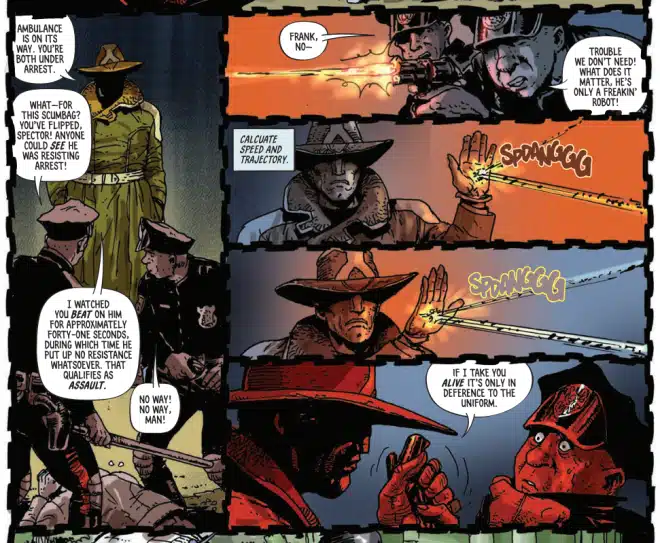Writer: Doug Wagner
Artists: Carlos Ezquerra (p. 3-22) and Dan Cornwell (p. 23-102)
Colorist: Dylan Teague
Letterer: Jim Campbell
Publisher: Rebellion
No one satirizes law and justice like Doug Wagner and Carlos Ezquerra. Their most important creation, Judge Dredd, is essentially a ‘point and laugh’ mockery of policing in America and the UK, in which judges roam the streets shooting first and asking questions never while dishing out thousand-year sentences to criminals of all kinds. With this icon under their belts, the announcement of a new comic by the powerhouse team about a robot detective that is programmed to be incorruptible, titled Spector, would’ve made anyone think that we were in for a variant of the Dredd formula.
Nothing could be further from the truth with this one. Spector is perhaps Wagner and Ezquerra at their most satirical, and the sci-fi future they paint is one that is even more frighteningly plausible than the one painted in Dredd comics. It’s perhaps why this story invites so much humor. It’s easier to laugh at impending doom rather than just screaming in horror at it.
Quick note. Because of Ezquerra’s passing, artist Dan Cornwell was brought in to finish the story. There’s a difference in styles, but Cornwell manages to capture Ezquerra’s vision well. The book remains cohesive, and it honors the original design throughout.

Spector follows a robot detective that’s been programmed to be immune to bribery and corrupt influences in a future city, the kind you’d be likely to find in a 2000AD (dirty, cyberpunk-ish, and Orwellian). The robot goes by Spector and he looks like an old-fashioned US marshal crossed with Arnold Schwarzenegger in The Terminator. He even tries to learn a few jokes to be more relatable to his flesh and blood counterparts, much like the time traveling robot. His presence has not been met with enthusiasm by human police officers. Given the level of unethical depravity that goes unchecked in the department, cops don’t feel they can go about their daily sins without being ratted out by Spector.
Given the disruption a good cop causes just by existing, Spector spends the entirety of the story avoiding character assassination and regular assassination plots as he attempts to clean up the system. To kick things off, he’s framed with the murder of a politician to see if the public relations nightmare this causes alone is enough to order an official shut down of robotic operations. From there, things escalate.
The comic takes to an episodic structure in terms of cases, but they’re all interconnected and they build towards a larger narrative that comes together in the final story. Each chapter, though, is more ridiculous than the last, and more satirical as a result.
Wagner’s script will delight lifelong fans of the author and 2000AD, and it does feel like a bit of a throwback. The ethical dilemmas of a robot taking over legal duties are not lost here, but they are simplified a bit to instead comment on how hard it is to create something reliably good for society. That the solution is the creation of an artificial being says a lot about humanity’s inability to adhere to simple moral codes. And yet, Wagner argues this within a classic sci-fi framework that aligns more with Isaac Asimov than the current debates on artificial intelligence.
This isn’t a story about the dangers of AI. Spector is ultimately about moral expectations and whether an incorruptible force could ever have a chance at making things better. Wagner seems to think that good will be met with resistance, no matter the form it takes.
This is where Spector completely differentiates himself from Dredd. Wagner is careful not to make his robot detective represent the dangers of unfettered law-making and the ease through which enforcers of the law can fall into fascistic behavior when in positions of power (which Dredd explores). Instead, Spector speaks to the importance of holding the line on moral and ethical action. That said, we’re shown how hard it is to follow the rules, and how difficult it is to hold absolutely everyone accountable for their actions. That is, unless you’re a morally sound robot. In which case you’re fine.
Ezquerra and Cornwell captures this well, leaning on a bit of aggressive slapstick in parts to keep things lively. They channel a level of excess that reminds of Robocop. Robots look like killing machines that have their violence settings set to ultra, and they pose a serious threat to anything standing in their way.
Surprisingly, the creative team borrow quite freely from the Inspector Gadget playbook here as they equip Spector with some nifty abilities to fight these bad bots. He can extend his hands to reach higher spots and pick up bad guys from afar, for instance. Spare parts are always at his disposal should he suffer battle damage. It’s playful and allows for some truly kinetic sequences that bring out the best in both artists. It’s clear everyone was having fun making this comic.
Spector is like a tasty guitar riff from some of the best to ever do it in the industry. It’s fun, has something to say, and it reminds longtime fans of the things legends can still pull off on the comics page. It’s bittersweet in the end knowing we won’t be getting any new Ezquerra comics in the future. But he did leave us with one final blockbuster ride that echoes the greatness of his past work while showcasing his ability to continue innovating even in his final days.
Verdict: BUY
Source link